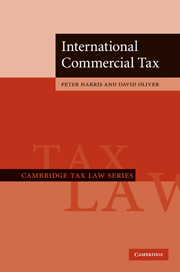Book contents
- Frontmatter
- Contents
- Preface
- List of abbreviations
- Table of Cases
- Table of statutes
- Table of treaties
- Introduction
- 1 Fundamentals and sources of international tax law
- 2 The jurisdiction to tax
- 3 Source country taxation
- 4 Residence country taxation
- 5 The limited scope of treaties
- 6 Changes of source and residence
- 7 Bilateral administrative issues
- Conclusion
- References
- Index
Introduction
Published online by Cambridge University Press: 03 May 2011
- Frontmatter
- Contents
- Preface
- List of abbreviations
- Table of Cases
- Table of statutes
- Table of treaties
- Introduction
- 1 Fundamentals and sources of international tax law
- 2 The jurisdiction to tax
- 3 Source country taxation
- 4 Residence country taxation
- 5 The limited scope of treaties
- 6 Changes of source and residence
- 7 Bilateral administrative issues
- Conclusion
- References
- Index
Summary
Introduction
Tax law is a dynamic area where politics, law, economics, commerce and accountancy intersect. It is renowned for its complexity and intricacy; typically the income tax law (or general tax code if applicable) is the longest law that a country has. At least in Britain, this has been the case for centuries. Tax law in practice is never pure from a conceptual or theoretical perspective. It is a fascinating mix of history, compromise and political rhetoric. Unlike other areas of law, where academic literature strives to uncover controversial and challenging issues, tax law is rife with fat and juicy issues. The challenge in the tax law field is securing agreement on any particular issue. Any change to a tax law almost inevitably involves winners and losers and so all tax reform is controversial. Added to this, the most important modern taxes are broad based and touch nearly every dealing, every interaction of life. Tax law is, therefore, necessarily a reflection of life. In this era of globalisation, the information age and the never-ending search for greater efficiency, our lives have become increasingly complex. So has tax law.
While any tax law book must struggle with these types of issues, an international tax law book takes on further dimensions. The international extension involves dealings taking place across international borders. As such, the participants in the dealing face not one but two systems of tax law.
- Type
- Chapter
- Information
- International Commercial Tax , pp. 1 - 7Publisher: Cambridge University PressPrint publication year: 2010

